Organisational Behaviour Report: Tesco's Culture and Motivation
VerifiedAdded on 2023/01/04
|15
|5176
|1
Report
AI Summary
This report delves into the realm of organisational behaviour, focusing on the case study of Tesco. It commences by examining how organisational culture, politics, and power dynamics influence individual and team behaviours, ultimately impacting performance. The report then transitions to explore process theories of motivation and how various motivational techniques affect the achievement of organisational goals. Furthermore, it provides insights into the significance of fostering dynamic cooperation within teams and with external stakeholders. Finally, the report concludes by outlining the key concepts and philosophies of organisational behaviour as they manifest within Tesco, providing a holistic view of the subject matter.
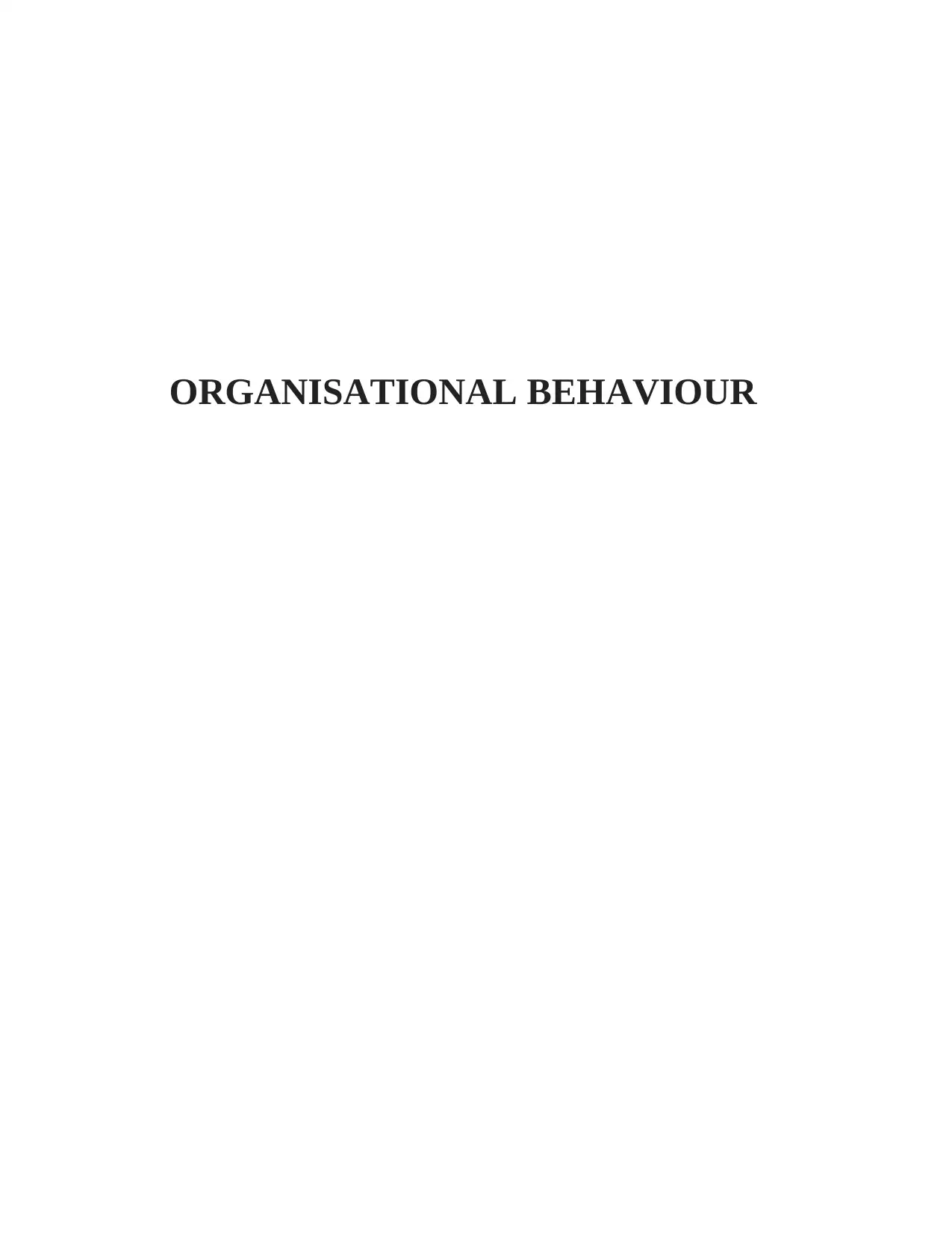
ORGANISATIONAL BEHAVIOUR
Paraphrase This Document
Need a fresh take? Get an instant paraphrase of this document with our AI Paraphraser
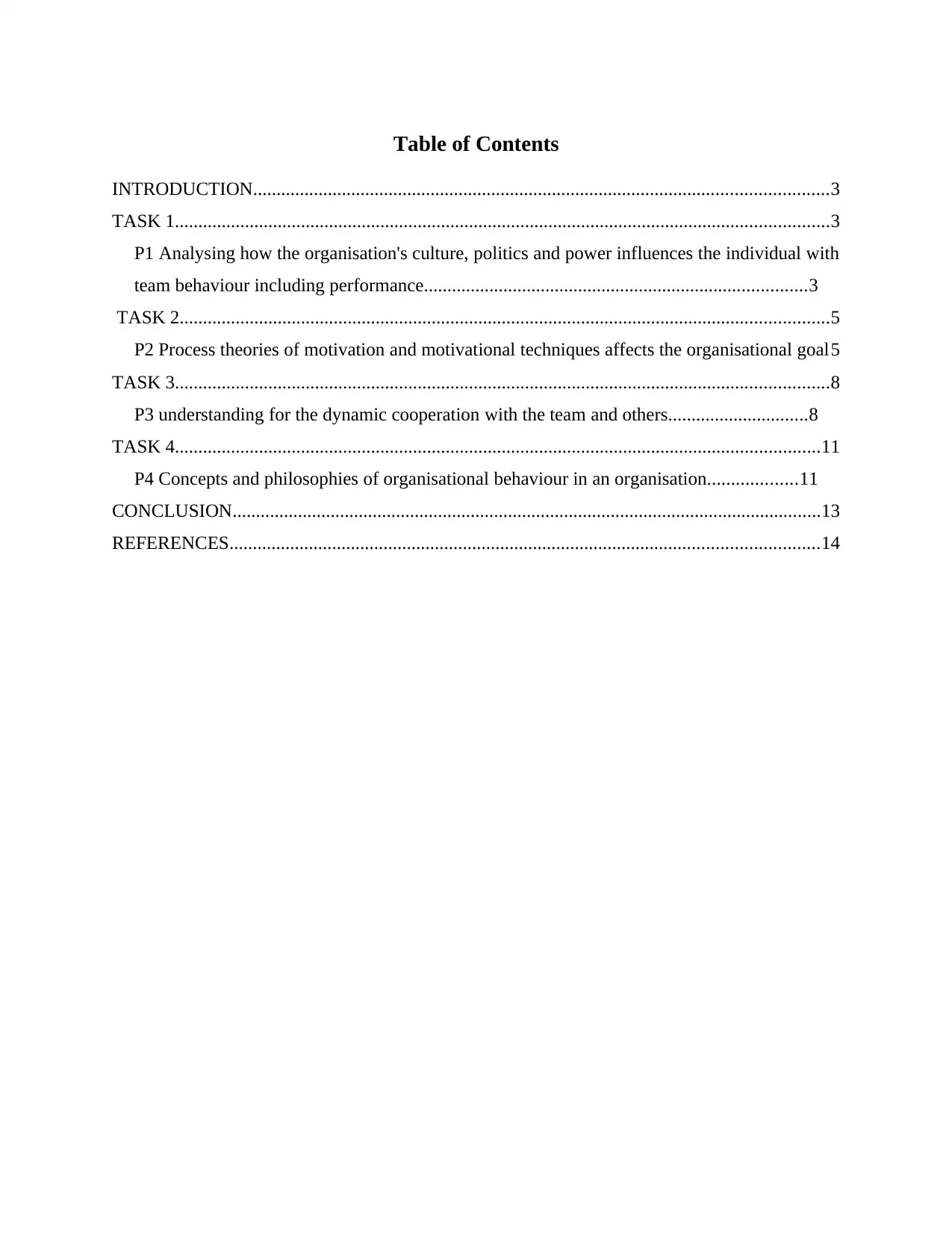
Table of Contents
INTRODUCTION...........................................................................................................................3
TASK 1............................................................................................................................................3
P1 Analysing how the organisation's culture, politics and power influences the individual with
team behaviour including performance..................................................................................3
TASK 2...........................................................................................................................................5
P2 Process theories of motivation and motivational techniques affects the organisational goal5
TASK 3............................................................................................................................................8
P3 understanding for the dynamic cooperation with the team and others..............................8
TASK 4..........................................................................................................................................11
P4 Concepts and philosophies of organisational behaviour in an organisation...................11
CONCLUSION..............................................................................................................................13
REFERENCES..............................................................................................................................14
INTRODUCTION...........................................................................................................................3
TASK 1............................................................................................................................................3
P1 Analysing how the organisation's culture, politics and power influences the individual with
team behaviour including performance..................................................................................3
TASK 2...........................................................................................................................................5
P2 Process theories of motivation and motivational techniques affects the organisational goal5
TASK 3............................................................................................................................................8
P3 understanding for the dynamic cooperation with the team and others..............................8
TASK 4..........................................................................................................................................11
P4 Concepts and philosophies of organisational behaviour in an organisation...................11
CONCLUSION..............................................................................................................................13
REFERENCES..............................................................................................................................14
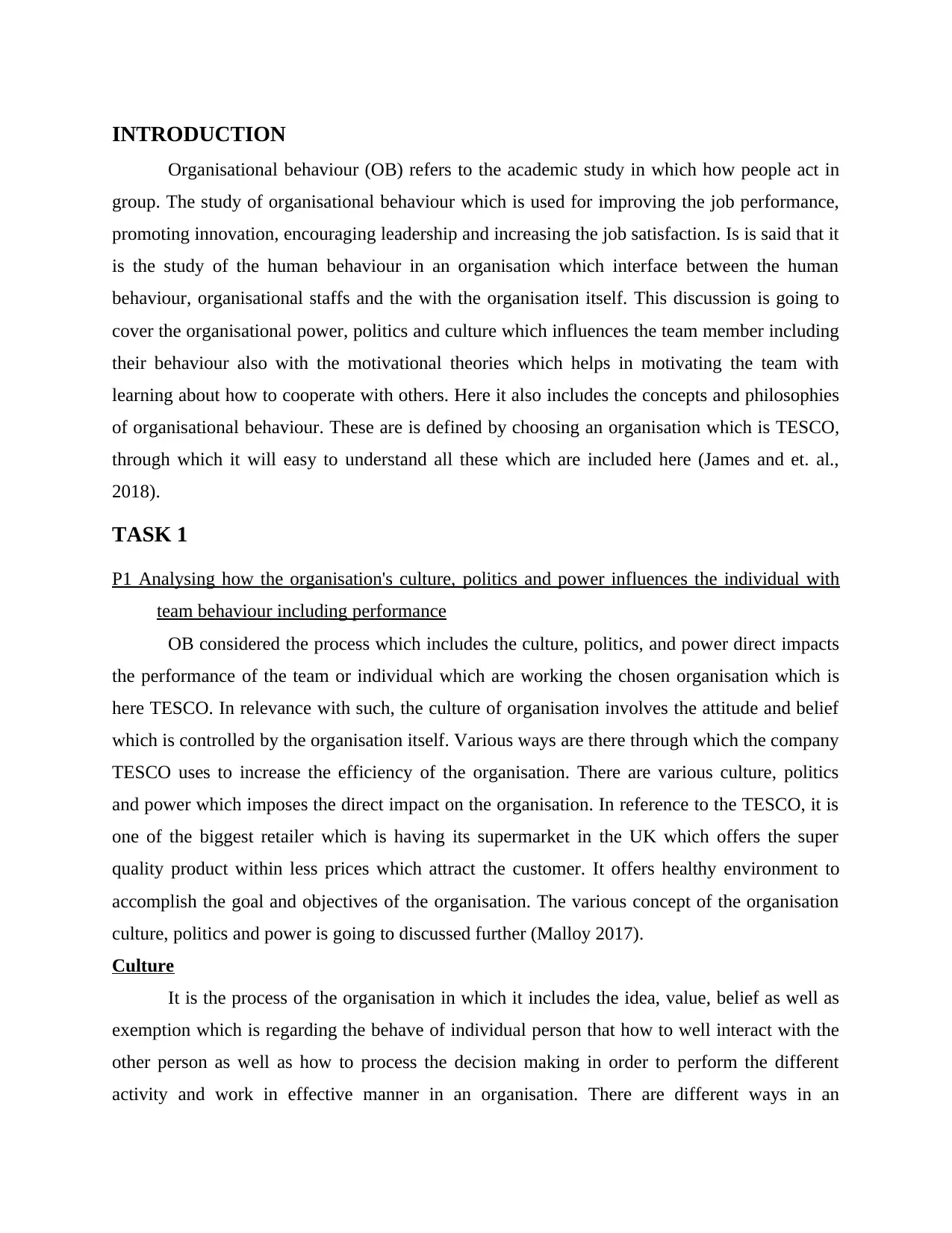
INTRODUCTION
Organisational behaviour (OB) refers to the academic study in which how people act in
group. The study of organisational behaviour which is used for improving the job performance,
promoting innovation, encouraging leadership and increasing the job satisfaction. Is is said that it
is the study of the human behaviour in an organisation which interface between the human
behaviour, organisational staffs and the with the organisation itself. This discussion is going to
cover the organisational power, politics and culture which influences the team member including
their behaviour also with the motivational theories which helps in motivating the team with
learning about how to cooperate with others. Here it also includes the concepts and philosophies
of organisational behaviour. These are is defined by choosing an organisation which is TESCO,
through which it will easy to understand all these which are included here (James and et. al.,
2018).
TASK 1
P1 Analysing how the organisation's culture, politics and power influences the individual with
team behaviour including performance
OB considered the process which includes the culture, politics, and power direct impacts
the performance of the team or individual which are working the chosen organisation which is
here TESCO. In relevance with such, the culture of organisation involves the attitude and belief
which is controlled by the organisation itself. Various ways are there through which the company
TESCO uses to increase the efficiency of the organisation. There are various culture, politics
and power which imposes the direct impact on the organisation. In reference to the TESCO, it is
one of the biggest retailer which is having its supermarket in the UK which offers the super
quality product within less prices which attract the customer. It offers healthy environment to
accomplish the goal and objectives of the organisation. The various concept of the organisation
culture, politics and power is going to discussed further (Malloy 2017).
Culture
It is the process of the organisation in which it includes the idea, value, belief as well as
exemption which is regarding the behave of individual person that how to well interact with the
other person as well as how to process the decision making in order to perform the different
activity and work in effective manner in an organisation. There are different ways in an
Organisational behaviour (OB) refers to the academic study in which how people act in
group. The study of organisational behaviour which is used for improving the job performance,
promoting innovation, encouraging leadership and increasing the job satisfaction. Is is said that it
is the study of the human behaviour in an organisation which interface between the human
behaviour, organisational staffs and the with the organisation itself. This discussion is going to
cover the organisational power, politics and culture which influences the team member including
their behaviour also with the motivational theories which helps in motivating the team with
learning about how to cooperate with others. Here it also includes the concepts and philosophies
of organisational behaviour. These are is defined by choosing an organisation which is TESCO,
through which it will easy to understand all these which are included here (James and et. al.,
2018).
TASK 1
P1 Analysing how the organisation's culture, politics and power influences the individual with
team behaviour including performance
OB considered the process which includes the culture, politics, and power direct impacts
the performance of the team or individual which are working the chosen organisation which is
here TESCO. In relevance with such, the culture of organisation involves the attitude and belief
which is controlled by the organisation itself. Various ways are there through which the company
TESCO uses to increase the efficiency of the organisation. There are various culture, politics
and power which imposes the direct impact on the organisation. In reference to the TESCO, it is
one of the biggest retailer which is having its supermarket in the UK which offers the super
quality product within less prices which attract the customer. It offers healthy environment to
accomplish the goal and objectives of the organisation. The various concept of the organisation
culture, politics and power is going to discussed further (Malloy 2017).
Culture
It is the process of the organisation in which it includes the idea, value, belief as well as
exemption which is regarding the behave of individual person that how to well interact with the
other person as well as how to process the decision making in order to perform the different
activity and work in effective manner in an organisation. There are different ways in an
⊘ This is a preview!⊘
Do you want full access?
Subscribe today to unlock all pages.

Trusted by 1+ million students worldwide
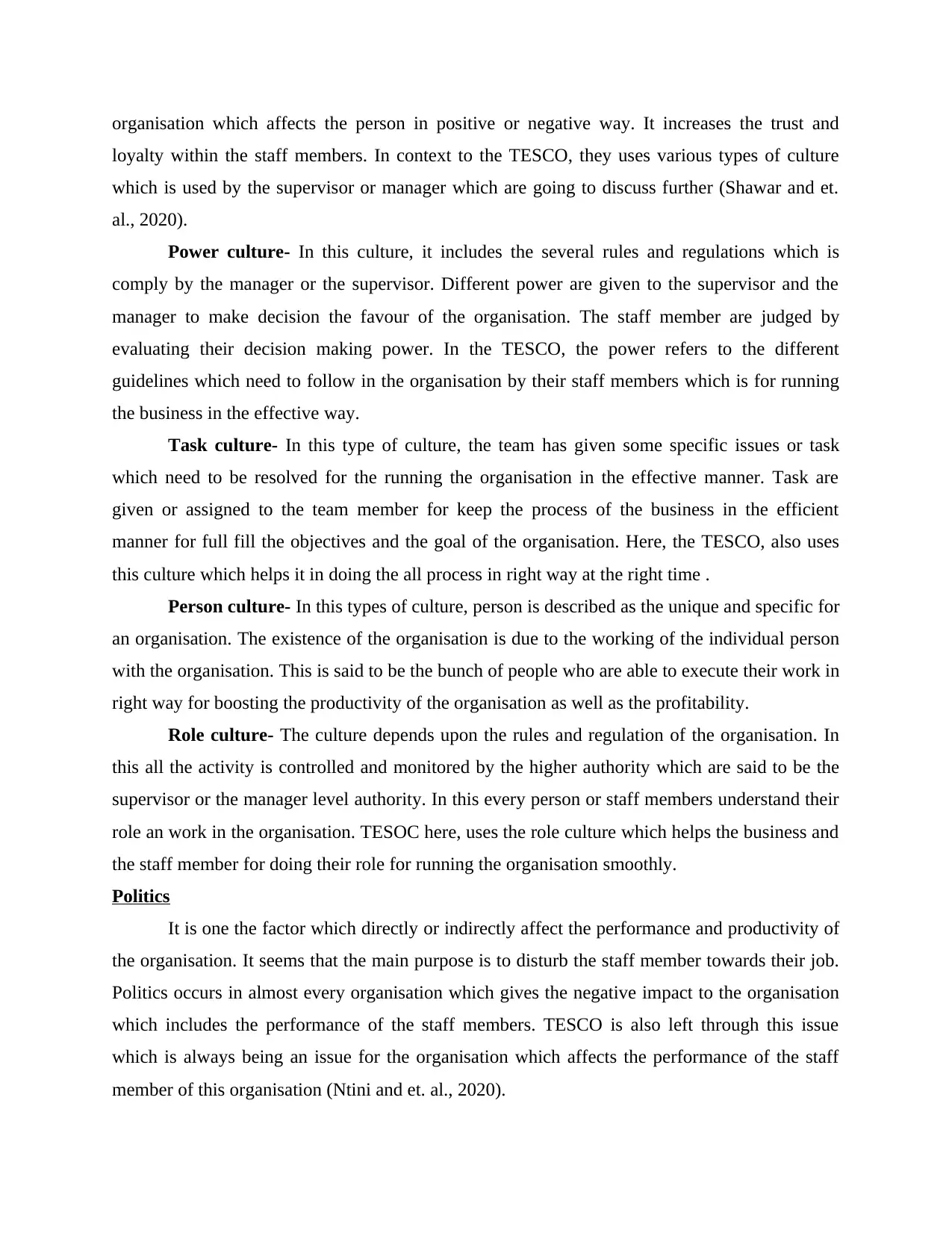
organisation which affects the person in positive or negative way. It increases the trust and
loyalty within the staff members. In context to the TESCO, they uses various types of culture
which is used by the supervisor or manager which are going to discuss further (Shawar and et.
al., 2020).
Power culture- In this culture, it includes the several rules and regulations which is
comply by the manager or the supervisor. Different power are given to the supervisor and the
manager to make decision the favour of the organisation. The staff member are judged by
evaluating their decision making power. In the TESCO, the power refers to the different
guidelines which need to follow in the organisation by their staff members which is for running
the business in the effective way.
Task culture- In this type of culture, the team has given some specific issues or task
which need to be resolved for the running the organisation in the effective manner. Task are
given or assigned to the team member for keep the process of the business in the efficient
manner for full fill the objectives and the goal of the organisation. Here, the TESCO, also uses
this culture which helps it in doing the all process in right way at the right time .
Person culture- In this types of culture, person is described as the unique and specific for
an organisation. The existence of the organisation is due to the working of the individual person
with the organisation. This is said to be the bunch of people who are able to execute their work in
right way for boosting the productivity of the organisation as well as the profitability.
Role culture- The culture depends upon the rules and regulation of the organisation. In
this all the activity is controlled and monitored by the higher authority which are said to be the
supervisor or the manager level authority. In this every person or staff members understand their
role an work in the organisation. TESOC here, uses the role culture which helps the business and
the staff member for doing their role for running the organisation smoothly.
Politics
It is one the factor which directly or indirectly affect the performance and productivity of
the organisation. It seems that the main purpose is to disturb the staff member towards their job.
Politics occurs in almost every organisation which gives the negative impact to the organisation
which includes the performance of the staff members. TESCO is also left through this issue
which is always being an issue for the organisation which affects the performance of the staff
member of this organisation (Ntini and et. al., 2020).
loyalty within the staff members. In context to the TESCO, they uses various types of culture
which is used by the supervisor or manager which are going to discuss further (Shawar and et.
al., 2020).
Power culture- In this culture, it includes the several rules and regulations which is
comply by the manager or the supervisor. Different power are given to the supervisor and the
manager to make decision the favour of the organisation. The staff member are judged by
evaluating their decision making power. In the TESCO, the power refers to the different
guidelines which need to follow in the organisation by their staff members which is for running
the business in the effective way.
Task culture- In this type of culture, the team has given some specific issues or task
which need to be resolved for the running the organisation in the effective manner. Task are
given or assigned to the team member for keep the process of the business in the efficient
manner for full fill the objectives and the goal of the organisation. Here, the TESCO, also uses
this culture which helps it in doing the all process in right way at the right time .
Person culture- In this types of culture, person is described as the unique and specific for
an organisation. The existence of the organisation is due to the working of the individual person
with the organisation. This is said to be the bunch of people who are able to execute their work in
right way for boosting the productivity of the organisation as well as the profitability.
Role culture- The culture depends upon the rules and regulation of the organisation. In
this all the activity is controlled and monitored by the higher authority which are said to be the
supervisor or the manager level authority. In this every person or staff members understand their
role an work in the organisation. TESOC here, uses the role culture which helps the business and
the staff member for doing their role for running the organisation smoothly.
Politics
It is one the factor which directly or indirectly affect the performance and productivity of
the organisation. It seems that the main purpose is to disturb the staff member towards their job.
Politics occurs in almost every organisation which gives the negative impact to the organisation
which includes the performance of the staff members. TESCO is also left through this issue
which is always being an issue for the organisation which affects the performance of the staff
member of this organisation (Ntini and et. al., 2020).
Paraphrase This Document
Need a fresh take? Get an instant paraphrase of this document with our AI Paraphraser
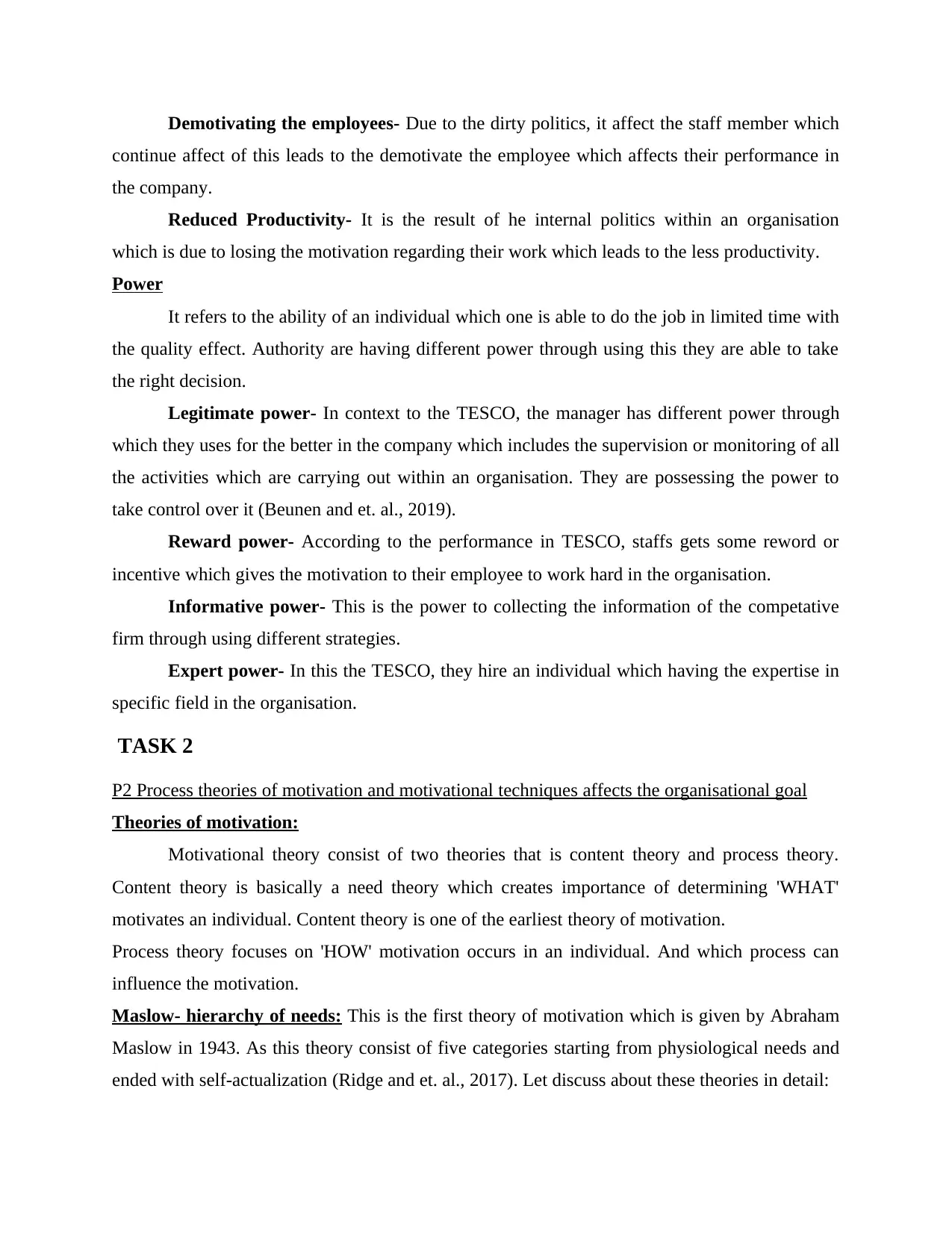
Demotivating the employees- Due to the dirty politics, it affect the staff member which
continue affect of this leads to the demotivate the employee which affects their performance in
the company.
Reduced Productivity- It is the result of he internal politics within an organisation
which is due to losing the motivation regarding their work which leads to the less productivity.
Power
It refers to the ability of an individual which one is able to do the job in limited time with
the quality effect. Authority are having different power through using this they are able to take
the right decision.
Legitimate power- In context to the TESCO, the manager has different power through
which they uses for the better in the company which includes the supervision or monitoring of all
the activities which are carrying out within an organisation. They are possessing the power to
take control over it (Beunen and et. al., 2019).
Reward power- According to the performance in TESCO, staffs gets some reword or
incentive which gives the motivation to their employee to work hard in the organisation.
Informative power- This is the power to collecting the information of the competative
firm through using different strategies.
Expert power- In this the TESCO, they hire an individual which having the expertise in
specific field in the organisation.
TASK 2
P2 Process theories of motivation and motivational techniques affects the organisational goal
Theories of motivation:
Motivational theory consist of two theories that is content theory and process theory.
Content theory is basically a need theory which creates importance of determining 'WHAT'
motivates an individual. Content theory is one of the earliest theory of motivation.
Process theory focuses on 'HOW' motivation occurs in an individual. And which process can
influence the motivation.
Maslow- hierarchy of needs: This is the first theory of motivation which is given by Abraham
Maslow in 1943. As this theory consist of five categories starting from physiological needs and
ended with self-actualization (Ridge and et. al., 2017). Let discuss about these theories in detail:
continue affect of this leads to the demotivate the employee which affects their performance in
the company.
Reduced Productivity- It is the result of he internal politics within an organisation
which is due to losing the motivation regarding their work which leads to the less productivity.
Power
It refers to the ability of an individual which one is able to do the job in limited time with
the quality effect. Authority are having different power through using this they are able to take
the right decision.
Legitimate power- In context to the TESCO, the manager has different power through
which they uses for the better in the company which includes the supervision or monitoring of all
the activities which are carrying out within an organisation. They are possessing the power to
take control over it (Beunen and et. al., 2019).
Reward power- According to the performance in TESCO, staffs gets some reword or
incentive which gives the motivation to their employee to work hard in the organisation.
Informative power- This is the power to collecting the information of the competative
firm through using different strategies.
Expert power- In this the TESCO, they hire an individual which having the expertise in
specific field in the organisation.
TASK 2
P2 Process theories of motivation and motivational techniques affects the organisational goal
Theories of motivation:
Motivational theory consist of two theories that is content theory and process theory.
Content theory is basically a need theory which creates importance of determining 'WHAT'
motivates an individual. Content theory is one of the earliest theory of motivation.
Process theory focuses on 'HOW' motivation occurs in an individual. And which process can
influence the motivation.
Maslow- hierarchy of needs: This is the first theory of motivation which is given by Abraham
Maslow in 1943. As this theory consist of five categories starting from physiological needs and
ended with self-actualization (Ridge and et. al., 2017). Let discuss about these theories in detail:
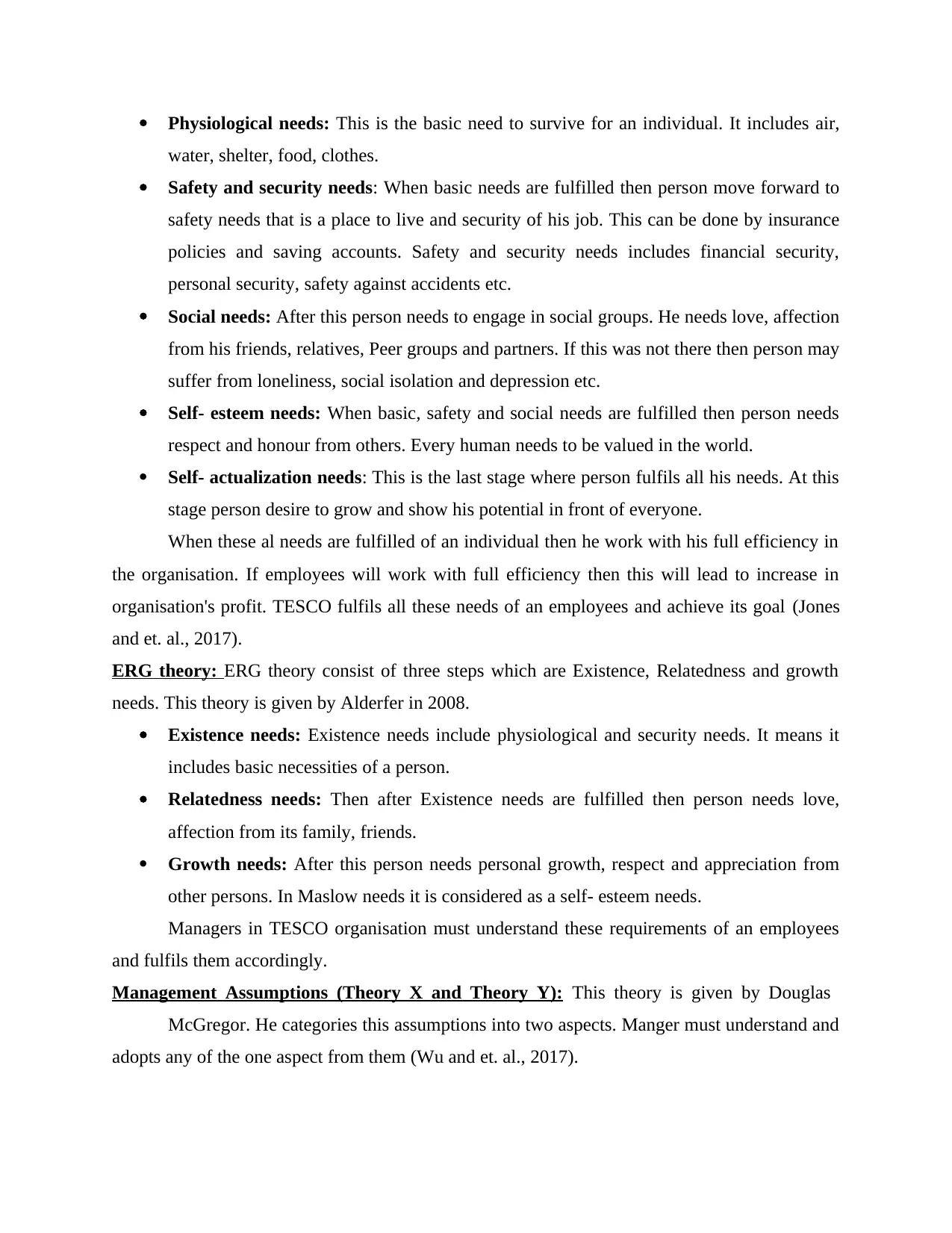
Physiological needs: This is the basic need to survive for an individual. It includes air,
water, shelter, food, clothes.
Safety and security needs: When basic needs are fulfilled then person move forward to
safety needs that is a place to live and security of his job. This can be done by insurance
policies and saving accounts. Safety and security needs includes financial security,
personal security, safety against accidents etc.
Social needs: After this person needs to engage in social groups. He needs love, affection
from his friends, relatives, Peer groups and partners. If this was not there then person may
suffer from loneliness, social isolation and depression etc.
Self- esteem needs: When basic, safety and social needs are fulfilled then person needs
respect and honour from others. Every human needs to be valued in the world.
Self- actualization needs: This is the last stage where person fulfils all his needs. At this
stage person desire to grow and show his potential in front of everyone.
When these al needs are fulfilled of an individual then he work with his full efficiency in
the organisation. If employees will work with full efficiency then this will lead to increase in
organisation's profit. TESCO fulfils all these needs of an employees and achieve its goal (Jones
and et. al., 2017).
ERG theory: ERG theory consist of three steps which are Existence, Relatedness and growth
needs. This theory is given by Alderfer in 2008.
Existence needs: Existence needs include physiological and security needs. It means it
includes basic necessities of a person.
Relatedness needs: Then after Existence needs are fulfilled then person needs love,
affection from its family, friends.
Growth needs: After this person needs personal growth, respect and appreciation from
other persons. In Maslow needs it is considered as a self- esteem needs.
Managers in TESCO organisation must understand these requirements of an employees
and fulfils them accordingly.
Management Assumptions (Theory X and Theory Y): This theory is given by Douglas
McGregor. He categories this assumptions into two aspects. Manger must understand and
adopts any of the one aspect from them (Wu and et. al., 2017).
water, shelter, food, clothes.
Safety and security needs: When basic needs are fulfilled then person move forward to
safety needs that is a place to live and security of his job. This can be done by insurance
policies and saving accounts. Safety and security needs includes financial security,
personal security, safety against accidents etc.
Social needs: After this person needs to engage in social groups. He needs love, affection
from his friends, relatives, Peer groups and partners. If this was not there then person may
suffer from loneliness, social isolation and depression etc.
Self- esteem needs: When basic, safety and social needs are fulfilled then person needs
respect and honour from others. Every human needs to be valued in the world.
Self- actualization needs: This is the last stage where person fulfils all his needs. At this
stage person desire to grow and show his potential in front of everyone.
When these al needs are fulfilled of an individual then he work with his full efficiency in
the organisation. If employees will work with full efficiency then this will lead to increase in
organisation's profit. TESCO fulfils all these needs of an employees and achieve its goal (Jones
and et. al., 2017).
ERG theory: ERG theory consist of three steps which are Existence, Relatedness and growth
needs. This theory is given by Alderfer in 2008.
Existence needs: Existence needs include physiological and security needs. It means it
includes basic necessities of a person.
Relatedness needs: Then after Existence needs are fulfilled then person needs love,
affection from its family, friends.
Growth needs: After this person needs personal growth, respect and appreciation from
other persons. In Maslow needs it is considered as a self- esteem needs.
Managers in TESCO organisation must understand these requirements of an employees
and fulfils them accordingly.
Management Assumptions (Theory X and Theory Y): This theory is given by Douglas
McGregor. He categories this assumptions into two aspects. Manger must understand and
adopts any of the one aspect from them (Wu and et. al., 2017).
⊘ This is a preview!⊘
Do you want full access?
Subscribe today to unlock all pages.

Trusted by 1+ million students worldwide
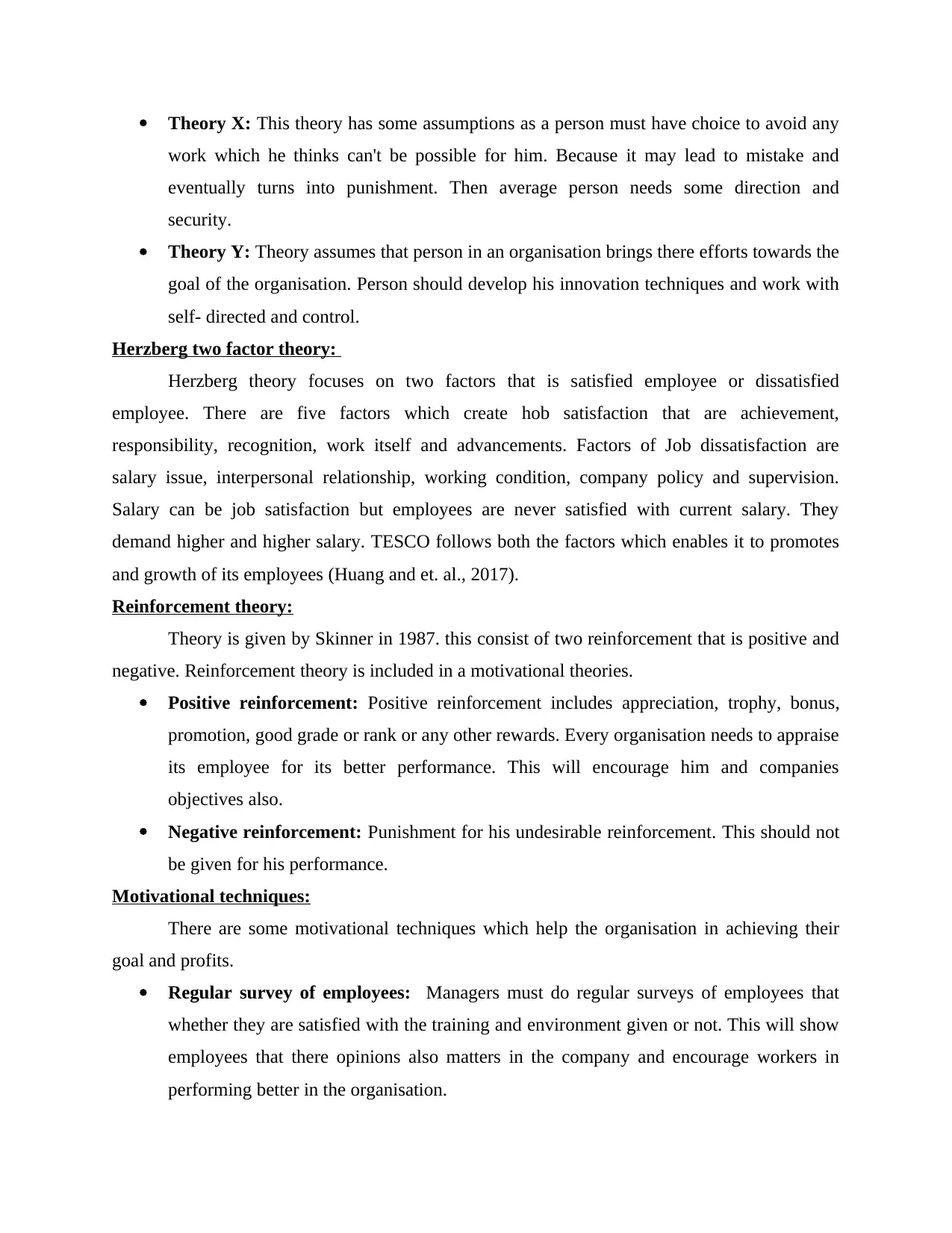
Theory X: This theory has some assumptions as a person must have choice to avoid any
work which he thinks can't be possible for him. Because it may lead to mistake and
eventually turns into punishment. Then average person needs some direction and
security.
Theory Y: Theory assumes that person in an organisation brings there efforts towards the
goal of the organisation. Person should develop his innovation techniques and work with
self- directed and control.
Herzberg two factor theory:
Herzberg theory focuses on two factors that is satisfied employee or dissatisfied
employee. There are five factors which create hob satisfaction that are achievement,
responsibility, recognition, work itself and advancements. Factors of Job dissatisfaction are
salary issue, interpersonal relationship, working condition, company policy and supervision.
Salary can be job satisfaction but employees are never satisfied with current salary. They
demand higher and higher salary. TESCO follows both the factors which enables it to promotes
and growth of its employees (Huang and et. al., 2017).
Reinforcement theory:
Theory is given by Skinner in 1987. this consist of two reinforcement that is positive and
negative. Reinforcement theory is included in a motivational theories.
Positive reinforcement: Positive reinforcement includes appreciation, trophy, bonus,
promotion, good grade or rank or any other rewards. Every organisation needs to appraise
its employee for its better performance. This will encourage him and companies
objectives also.
Negative reinforcement: Punishment for his undesirable reinforcement. This should not
be given for his performance.
Motivational techniques:
There are some motivational techniques which help the organisation in achieving their
goal and profits.
Regular survey of employees: Managers must do regular surveys of employees that
whether they are satisfied with the training and environment given or not. This will show
employees that there opinions also matters in the company and encourage workers in
performing better in the organisation.
work which he thinks can't be possible for him. Because it may lead to mistake and
eventually turns into punishment. Then average person needs some direction and
security.
Theory Y: Theory assumes that person in an organisation brings there efforts towards the
goal of the organisation. Person should develop his innovation techniques and work with
self- directed and control.
Herzberg two factor theory:
Herzberg theory focuses on two factors that is satisfied employee or dissatisfied
employee. There are five factors which create hob satisfaction that are achievement,
responsibility, recognition, work itself and advancements. Factors of Job dissatisfaction are
salary issue, interpersonal relationship, working condition, company policy and supervision.
Salary can be job satisfaction but employees are never satisfied with current salary. They
demand higher and higher salary. TESCO follows both the factors which enables it to promotes
and growth of its employees (Huang and et. al., 2017).
Reinforcement theory:
Theory is given by Skinner in 1987. this consist of two reinforcement that is positive and
negative. Reinforcement theory is included in a motivational theories.
Positive reinforcement: Positive reinforcement includes appreciation, trophy, bonus,
promotion, good grade or rank or any other rewards. Every organisation needs to appraise
its employee for its better performance. This will encourage him and companies
objectives also.
Negative reinforcement: Punishment for his undesirable reinforcement. This should not
be given for his performance.
Motivational techniques:
There are some motivational techniques which help the organisation in achieving their
goal and profits.
Regular survey of employees: Managers must do regular surveys of employees that
whether they are satisfied with the training and environment given or not. This will show
employees that there opinions also matters in the company and encourage workers in
performing better in the organisation.
Paraphrase This Document
Need a fresh take? Get an instant paraphrase of this document with our AI Paraphraser
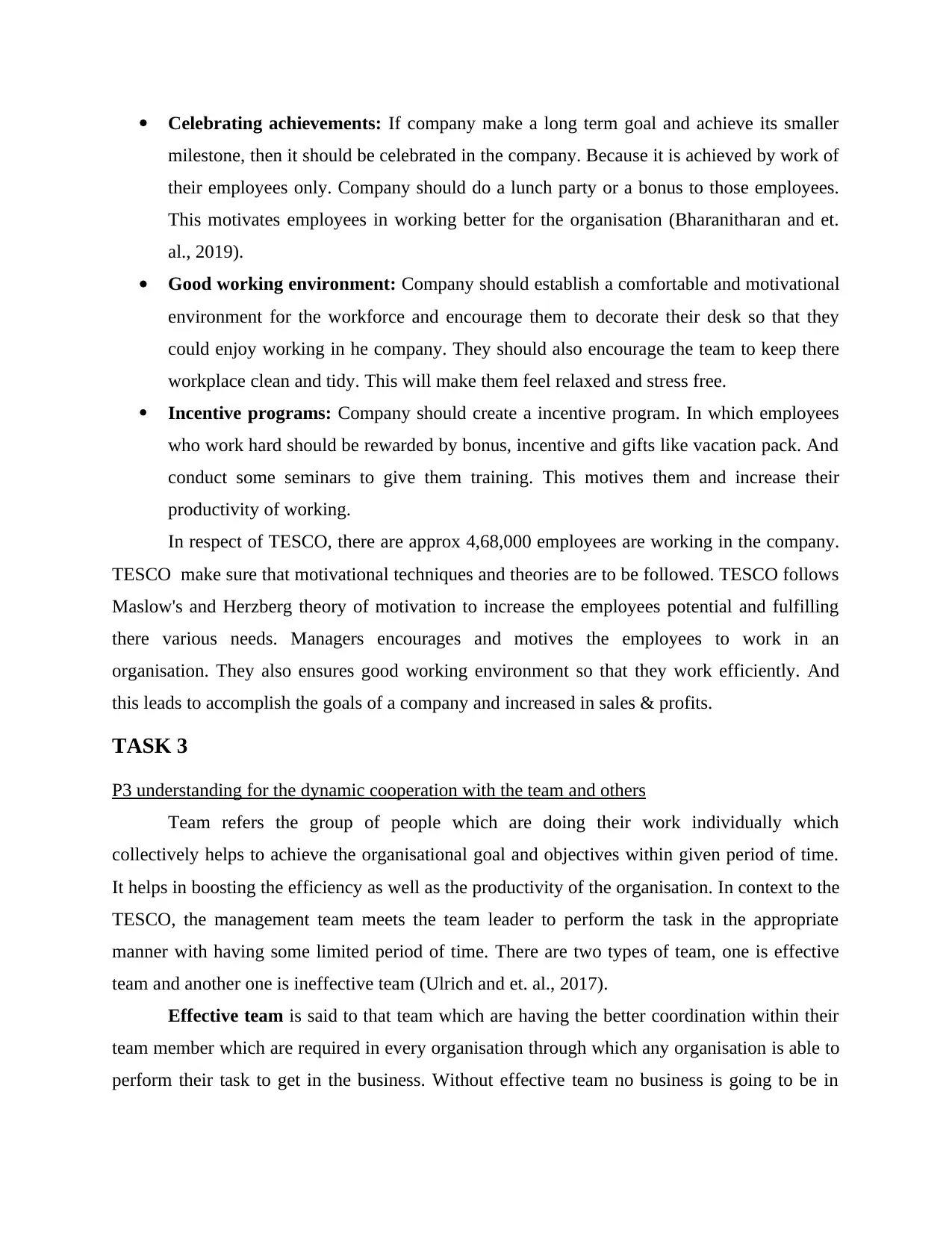
Celebrating achievements: If company make a long term goal and achieve its smaller
milestone, then it should be celebrated in the company. Because it is achieved by work of
their employees only. Company should do a lunch party or a bonus to those employees.
This motivates employees in working better for the organisation (Bharanitharan and et.
al., 2019).
Good working environment: Company should establish a comfortable and motivational
environment for the workforce and encourage them to decorate their desk so that they
could enjoy working in he company. They should also encourage the team to keep there
workplace clean and tidy. This will make them feel relaxed and stress free.
Incentive programs: Company should create a incentive program. In which employees
who work hard should be rewarded by bonus, incentive and gifts like vacation pack. And
conduct some seminars to give them training. This motives them and increase their
productivity of working.
In respect of TESCO, there are approx 4,68,000 employees are working in the company.
TESCO make sure that motivational techniques and theories are to be followed. TESCO follows
Maslow's and Herzberg theory of motivation to increase the employees potential and fulfilling
there various needs. Managers encourages and motives the employees to work in an
organisation. They also ensures good working environment so that they work efficiently. And
this leads to accomplish the goals of a company and increased in sales & profits.
TASK 3
P3 understanding for the dynamic cooperation with the team and others
Team refers the group of people which are doing their work individually which
collectively helps to achieve the organisational goal and objectives within given period of time.
It helps in boosting the efficiency as well as the productivity of the organisation. In context to the
TESCO, the management team meets the team leader to perform the task in the appropriate
manner with having some limited period of time. There are two types of team, one is effective
team and another one is ineffective team (Ulrich and et. al., 2017).
Effective team is said to that team which are having the better coordination within their
team member which are required in every organisation through which any organisation is able to
perform their task to get in the business. Without effective team no business is going to be in
milestone, then it should be celebrated in the company. Because it is achieved by work of
their employees only. Company should do a lunch party or a bonus to those employees.
This motivates employees in working better for the organisation (Bharanitharan and et.
al., 2019).
Good working environment: Company should establish a comfortable and motivational
environment for the workforce and encourage them to decorate their desk so that they
could enjoy working in he company. They should also encourage the team to keep there
workplace clean and tidy. This will make them feel relaxed and stress free.
Incentive programs: Company should create a incentive program. In which employees
who work hard should be rewarded by bonus, incentive and gifts like vacation pack. And
conduct some seminars to give them training. This motives them and increase their
productivity of working.
In respect of TESCO, there are approx 4,68,000 employees are working in the company.
TESCO make sure that motivational techniques and theories are to be followed. TESCO follows
Maslow's and Herzberg theory of motivation to increase the employees potential and fulfilling
there various needs. Managers encourages and motives the employees to work in an
organisation. They also ensures good working environment so that they work efficiently. And
this leads to accomplish the goals of a company and increased in sales & profits.
TASK 3
P3 understanding for the dynamic cooperation with the team and others
Team refers the group of people which are doing their work individually which
collectively helps to achieve the organisational goal and objectives within given period of time.
It helps in boosting the efficiency as well as the productivity of the organisation. In context to the
TESCO, the management team meets the team leader to perform the task in the appropriate
manner with having some limited period of time. There are two types of team, one is effective
team and another one is ineffective team (Ulrich and et. al., 2017).
Effective team is said to that team which are having the better coordination within their
team member which are required in every organisation through which any organisation is able to
perform their task to get in the business. Without effective team no business is going to be in
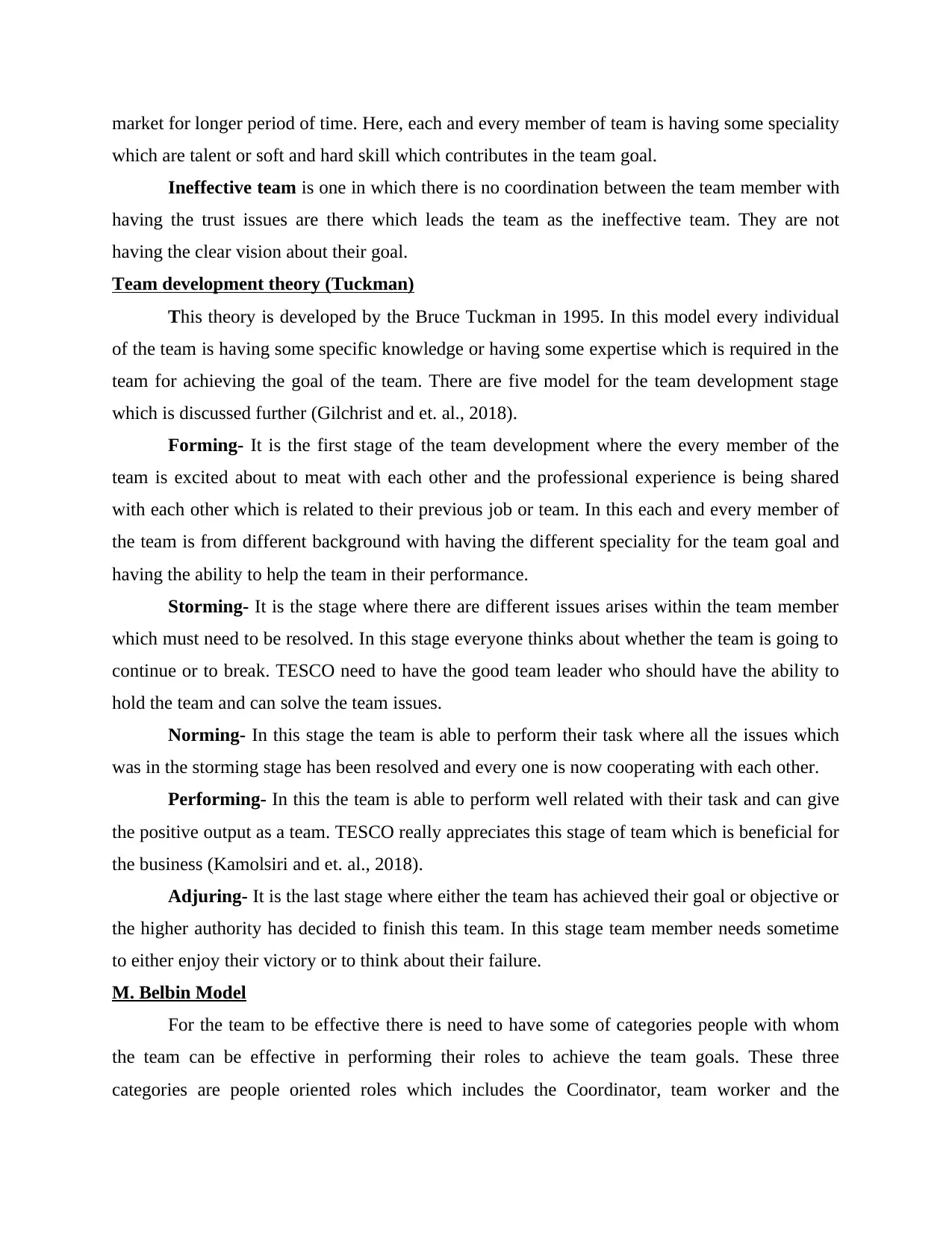
market for longer period of time. Here, each and every member of team is having some speciality
which are talent or soft and hard skill which contributes in the team goal.
Ineffective team is one in which there is no coordination between the team member with
having the trust issues are there which leads the team as the ineffective team. They are not
having the clear vision about their goal.
Team development theory (Tuckman)
This theory is developed by the Bruce Tuckman in 1995. In this model every individual
of the team is having some specific knowledge or having some expertise which is required in the
team for achieving the goal of the team. There are five model for the team development stage
which is discussed further (Gilchrist and et. al., 2018).
Forming- It is the first stage of the team development where the every member of the
team is excited about to meat with each other and the professional experience is being shared
with each other which is related to their previous job or team. In this each and every member of
the team is from different background with having the different speciality for the team goal and
having the ability to help the team in their performance.
Storming- It is the stage where there are different issues arises within the team member
which must need to be resolved. In this stage everyone thinks about whether the team is going to
continue or to break. TESCO need to have the good team leader who should have the ability to
hold the team and can solve the team issues.
Norming- In this stage the team is able to perform their task where all the issues which
was in the storming stage has been resolved and every one is now cooperating with each other.
Performing- In this the team is able to perform well related with their task and can give
the positive output as a team. TESCO really appreciates this stage of team which is beneficial for
the business (Kamolsiri and et. al., 2018).
Adjuring- It is the last stage where either the team has achieved their goal or objective or
the higher authority has decided to finish this team. In this stage team member needs sometime
to either enjoy their victory or to think about their failure.
M. Belbin Model
For the team to be effective there is need to have some of categories people with whom
the team can be effective in performing their roles to achieve the team goals. These three
categories are people oriented roles which includes the Coordinator, team worker and the
which are talent or soft and hard skill which contributes in the team goal.
Ineffective team is one in which there is no coordination between the team member with
having the trust issues are there which leads the team as the ineffective team. They are not
having the clear vision about their goal.
Team development theory (Tuckman)
This theory is developed by the Bruce Tuckman in 1995. In this model every individual
of the team is having some specific knowledge or having some expertise which is required in the
team for achieving the goal of the team. There are five model for the team development stage
which is discussed further (Gilchrist and et. al., 2018).
Forming- It is the first stage of the team development where the every member of the
team is excited about to meat with each other and the professional experience is being shared
with each other which is related to their previous job or team. In this each and every member of
the team is from different background with having the different speciality for the team goal and
having the ability to help the team in their performance.
Storming- It is the stage where there are different issues arises within the team member
which must need to be resolved. In this stage everyone thinks about whether the team is going to
continue or to break. TESCO need to have the good team leader who should have the ability to
hold the team and can solve the team issues.
Norming- In this stage the team is able to perform their task where all the issues which
was in the storming stage has been resolved and every one is now cooperating with each other.
Performing- In this the team is able to perform well related with their task and can give
the positive output as a team. TESCO really appreciates this stage of team which is beneficial for
the business (Kamolsiri and et. al., 2018).
Adjuring- It is the last stage where either the team has achieved their goal or objective or
the higher authority has decided to finish this team. In this stage team member needs sometime
to either enjoy their victory or to think about their failure.
M. Belbin Model
For the team to be effective there is need to have some of categories people with whom
the team can be effective in performing their roles to achieve the team goals. These three
categories are people oriented roles which includes the Coordinator, team worker and the
⊘ This is a preview!⊘
Do you want full access?
Subscribe today to unlock all pages.

Trusted by 1+ million students worldwide
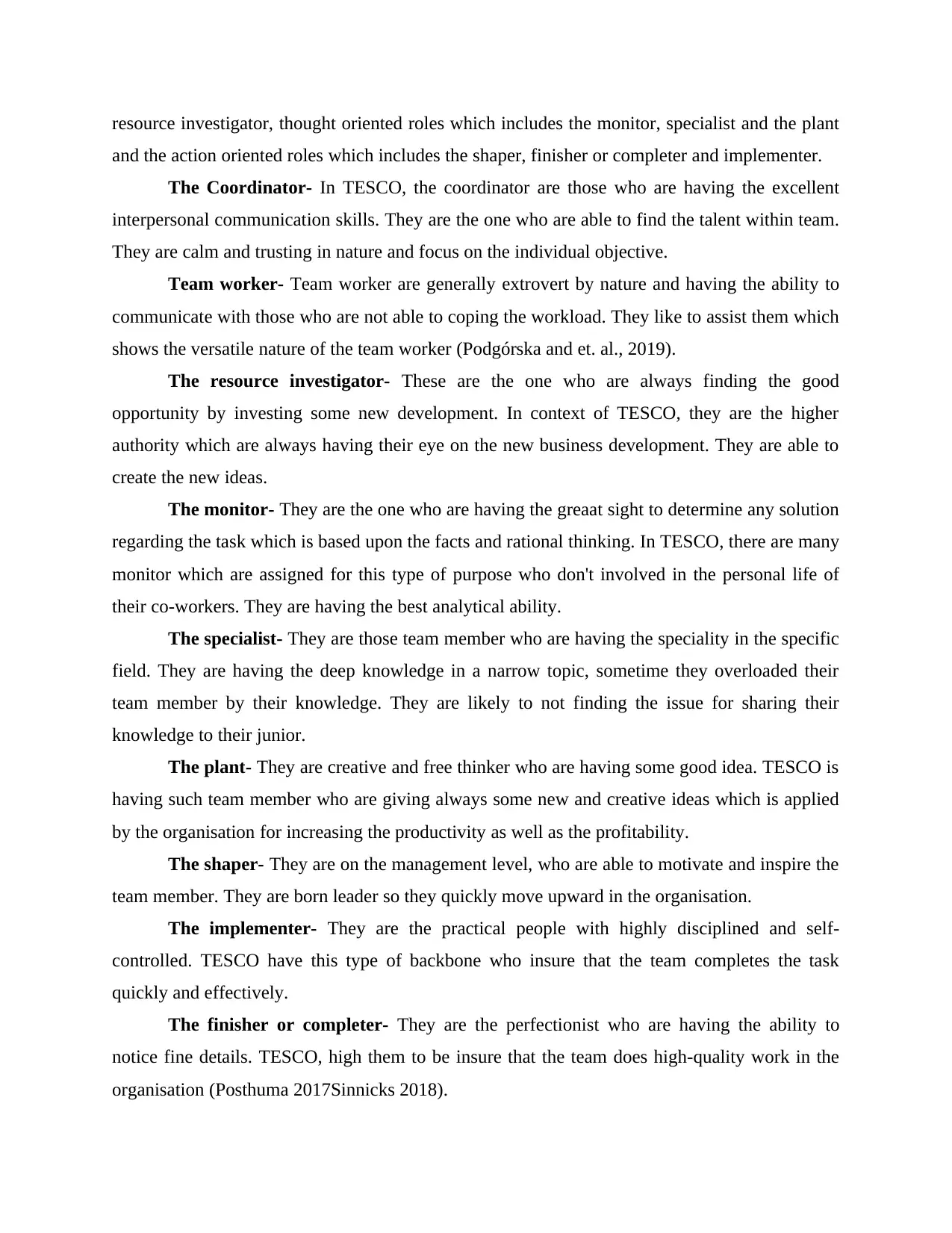
resource investigator, thought oriented roles which includes the monitor, specialist and the plant
and the action oriented roles which includes the shaper, finisher or completer and implementer.
The Coordinator- In TESCO, the coordinator are those who are having the excellent
interpersonal communication skills. They are the one who are able to find the talent within team.
They are calm and trusting in nature and focus on the individual objective.
Team worker- Team worker are generally extrovert by nature and having the ability to
communicate with those who are not able to coping the workload. They like to assist them which
shows the versatile nature of the team worker (Podgórska and et. al., 2019).
The resource investigator- These are the one who are always finding the good
opportunity by investing some new development. In context of TESCO, they are the higher
authority which are always having their eye on the new business development. They are able to
create the new ideas.
The monitor- They are the one who are having the greaat sight to determine any solution
regarding the task which is based upon the facts and rational thinking. In TESCO, there are many
monitor which are assigned for this type of purpose who don't involved in the personal life of
their co-workers. They are having the best analytical ability.
The specialist- They are those team member who are having the speciality in the specific
field. They are having the deep knowledge in a narrow topic, sometime they overloaded their
team member by their knowledge. They are likely to not finding the issue for sharing their
knowledge to their junior.
The plant- They are creative and free thinker who are having some good idea. TESCO is
having such team member who are giving always some new and creative ideas which is applied
by the organisation for increasing the productivity as well as the profitability.
The shaper- They are on the management level, who are able to motivate and inspire the
team member. They are born leader so they quickly move upward in the organisation.
The implementer- They are the practical people with highly disciplined and self-
controlled. TESCO have this type of backbone who insure that the team completes the task
quickly and effectively.
The finisher or completer- They are the perfectionist who are having the ability to
notice fine details. TESCO, high them to be insure that the team does high-quality work in the
organisation (Posthuma 2017Sinnicks 2018).
and the action oriented roles which includes the shaper, finisher or completer and implementer.
The Coordinator- In TESCO, the coordinator are those who are having the excellent
interpersonal communication skills. They are the one who are able to find the talent within team.
They are calm and trusting in nature and focus on the individual objective.
Team worker- Team worker are generally extrovert by nature and having the ability to
communicate with those who are not able to coping the workload. They like to assist them which
shows the versatile nature of the team worker (Podgórska and et. al., 2019).
The resource investigator- These are the one who are always finding the good
opportunity by investing some new development. In context of TESCO, they are the higher
authority which are always having their eye on the new business development. They are able to
create the new ideas.
The monitor- They are the one who are having the greaat sight to determine any solution
regarding the task which is based upon the facts and rational thinking. In TESCO, there are many
monitor which are assigned for this type of purpose who don't involved in the personal life of
their co-workers. They are having the best analytical ability.
The specialist- They are those team member who are having the speciality in the specific
field. They are having the deep knowledge in a narrow topic, sometime they overloaded their
team member by their knowledge. They are likely to not finding the issue for sharing their
knowledge to their junior.
The plant- They are creative and free thinker who are having some good idea. TESCO is
having such team member who are giving always some new and creative ideas which is applied
by the organisation for increasing the productivity as well as the profitability.
The shaper- They are on the management level, who are able to motivate and inspire the
team member. They are born leader so they quickly move upward in the organisation.
The implementer- They are the practical people with highly disciplined and self-
controlled. TESCO have this type of backbone who insure that the team completes the task
quickly and effectively.
The finisher or completer- They are the perfectionist who are having the ability to
notice fine details. TESCO, high them to be insure that the team does high-quality work in the
organisation (Posthuma 2017Sinnicks 2018).
Paraphrase This Document
Need a fresh take? Get an instant paraphrase of this document with our AI Paraphraser
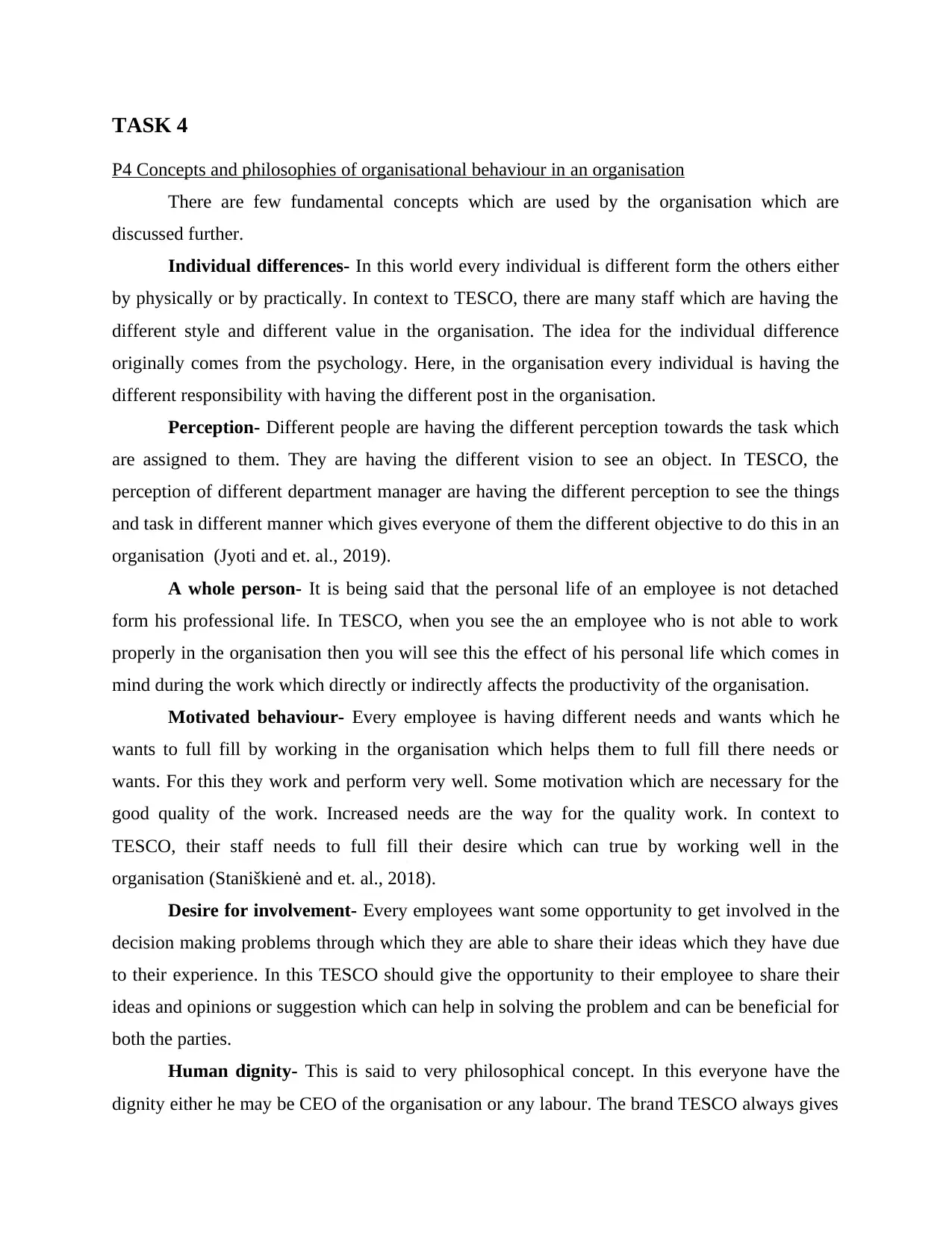
TASK 4
P4 Concepts and philosophies of organisational behaviour in an organisation
There are few fundamental concepts which are used by the organisation which are
discussed further.
Individual differences- In this world every individual is different form the others either
by physically or by practically. In context to TESCO, there are many staff which are having the
different style and different value in the organisation. The idea for the individual difference
originally comes from the psychology. Here, in the organisation every individual is having the
different responsibility with having the different post in the organisation.
Perception- Different people are having the different perception towards the task which
are assigned to them. They are having the different vision to see an object. In TESCO, the
perception of different department manager are having the different perception to see the things
and task in different manner which gives everyone of them the different objective to do this in an
organisation (Jyoti and et. al., 2019).
A whole person- It is being said that the personal life of an employee is not detached
form his professional life. In TESCO, when you see the an employee who is not able to work
properly in the organisation then you will see this the effect of his personal life which comes in
mind during the work which directly or indirectly affects the productivity of the organisation.
Motivated behaviour- Every employee is having different needs and wants which he
wants to full fill by working in the organisation which helps them to full fill there needs or
wants. For this they work and perform very well. Some motivation which are necessary for the
good quality of the work. Increased needs are the way for the quality work. In context to
TESCO, their staff needs to full fill their desire which can true by working well in the
organisation (Staniškienė and et. al., 2018).
Desire for involvement- Every employees want some opportunity to get involved in the
decision making problems through which they are able to share their ideas which they have due
to their experience. In this TESCO should give the opportunity to their employee to share their
ideas and opinions or suggestion which can help in solving the problem and can be beneficial for
both the parties.
Human dignity- This is said to very philosophical concept. In this everyone have the
dignity either he may be CEO of the organisation or any labour. The brand TESCO always gives
P4 Concepts and philosophies of organisational behaviour in an organisation
There are few fundamental concepts which are used by the organisation which are
discussed further.
Individual differences- In this world every individual is different form the others either
by physically or by practically. In context to TESCO, there are many staff which are having the
different style and different value in the organisation. The idea for the individual difference
originally comes from the psychology. Here, in the organisation every individual is having the
different responsibility with having the different post in the organisation.
Perception- Different people are having the different perception towards the task which
are assigned to them. They are having the different vision to see an object. In TESCO, the
perception of different department manager are having the different perception to see the things
and task in different manner which gives everyone of them the different objective to do this in an
organisation (Jyoti and et. al., 2019).
A whole person- It is being said that the personal life of an employee is not detached
form his professional life. In TESCO, when you see the an employee who is not able to work
properly in the organisation then you will see this the effect of his personal life which comes in
mind during the work which directly or indirectly affects the productivity of the organisation.
Motivated behaviour- Every employee is having different needs and wants which he
wants to full fill by working in the organisation which helps them to full fill there needs or
wants. For this they work and perform very well. Some motivation which are necessary for the
good quality of the work. Increased needs are the way for the quality work. In context to
TESCO, their staff needs to full fill their desire which can true by working well in the
organisation (Staniškienė and et. al., 2018).
Desire for involvement- Every employees want some opportunity to get involved in the
decision making problems through which they are able to share their ideas which they have due
to their experience. In this TESCO should give the opportunity to their employee to share their
ideas and opinions or suggestion which can help in solving the problem and can be beneficial for
both the parties.
Human dignity- This is said to very philosophical concept. In this everyone have the
dignity either he may be CEO of the organisation or any labour. The brand TESCO always gives
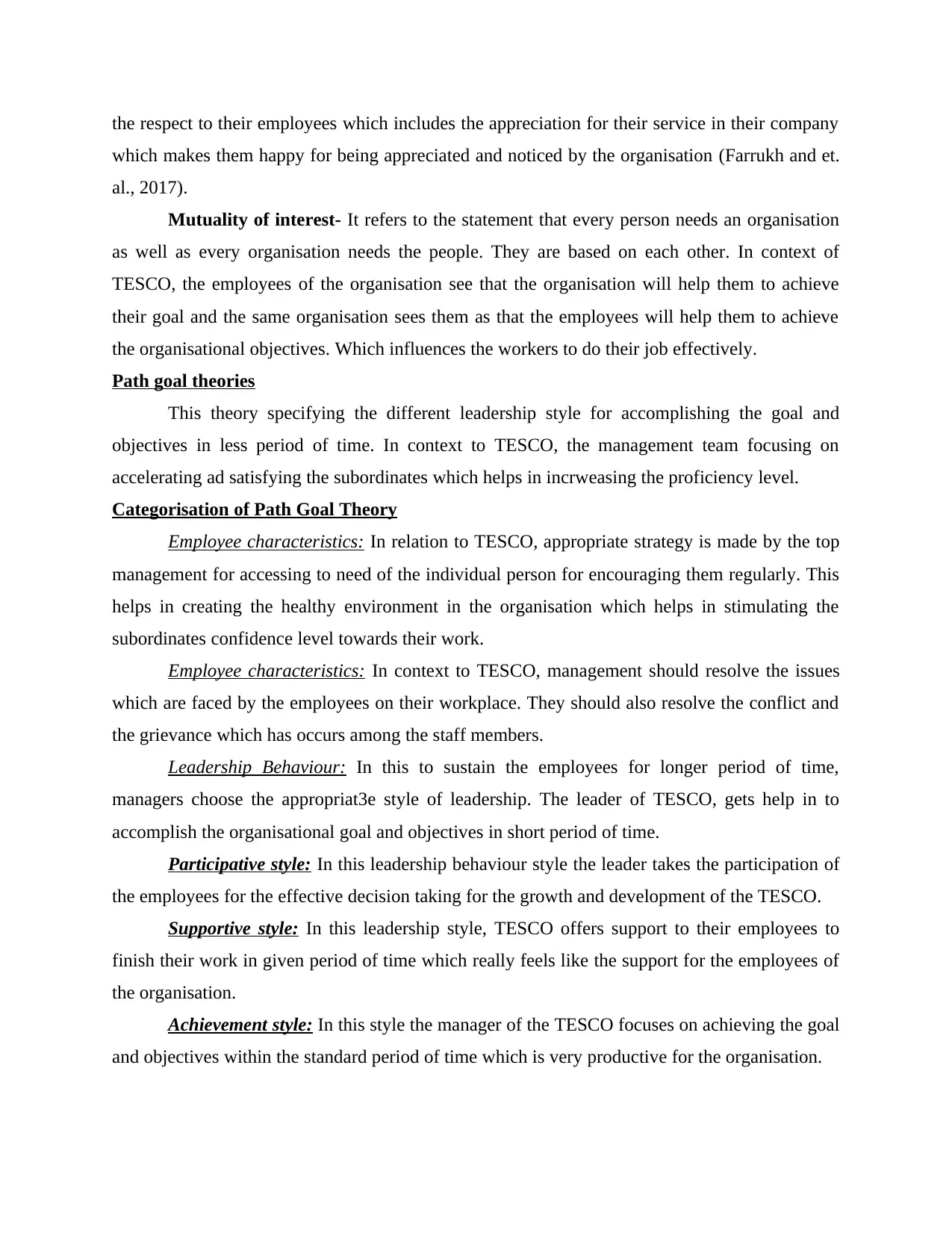
the respect to their employees which includes the appreciation for their service in their company
which makes them happy for being appreciated and noticed by the organisation (Farrukh and et.
al., 2017).
Mutuality of interest- It refers to the statement that every person needs an organisation
as well as every organisation needs the people. They are based on each other. In context of
TESCO, the employees of the organisation see that the organisation will help them to achieve
their goal and the same organisation sees them as that the employees will help them to achieve
the organisational objectives. Which influences the workers to do their job effectively.
Path goal theories
This theory specifying the different leadership style for accomplishing the goal and
objectives in less period of time. In context to TESCO, the management team focusing on
accelerating ad satisfying the subordinates which helps in incrweasing the proficiency level.
Categorisation of Path Goal Theory
Employee characteristics: In relation to TESCO, appropriate strategy is made by the top
management for accessing to need of the individual person for encouraging them regularly. This
helps in creating the healthy environment in the organisation which helps in stimulating the
subordinates confidence level towards their work.
Employee characteristics: In context to TESCO, management should resolve the issues
which are faced by the employees on their workplace. They should also resolve the conflict and
the grievance which has occurs among the staff members.
Leadership Behaviour: In this to sustain the employees for longer period of time,
managers choose the appropriat3e style of leadership. The leader of TESCO, gets help in to
accomplish the organisational goal and objectives in short period of time.
Participative style: In this leadership behaviour style the leader takes the participation of
the employees for the effective decision taking for the growth and development of the TESCO.
Supportive style: In this leadership style, TESCO offers support to their employees to
finish their work in given period of time which really feels like the support for the employees of
the organisation.
Achievement style: In this style the manager of the TESCO focuses on achieving the goal
and objectives within the standard period of time which is very productive for the organisation.
which makes them happy for being appreciated and noticed by the organisation (Farrukh and et.
al., 2017).
Mutuality of interest- It refers to the statement that every person needs an organisation
as well as every organisation needs the people. They are based on each other. In context of
TESCO, the employees of the organisation see that the organisation will help them to achieve
their goal and the same organisation sees them as that the employees will help them to achieve
the organisational objectives. Which influences the workers to do their job effectively.
Path goal theories
This theory specifying the different leadership style for accomplishing the goal and
objectives in less period of time. In context to TESCO, the management team focusing on
accelerating ad satisfying the subordinates which helps in incrweasing the proficiency level.
Categorisation of Path Goal Theory
Employee characteristics: In relation to TESCO, appropriate strategy is made by the top
management for accessing to need of the individual person for encouraging them regularly. This
helps in creating the healthy environment in the organisation which helps in stimulating the
subordinates confidence level towards their work.
Employee characteristics: In context to TESCO, management should resolve the issues
which are faced by the employees on their workplace. They should also resolve the conflict and
the grievance which has occurs among the staff members.
Leadership Behaviour: In this to sustain the employees for longer period of time,
managers choose the appropriat3e style of leadership. The leader of TESCO, gets help in to
accomplish the organisational goal and objectives in short period of time.
Participative style: In this leadership behaviour style the leader takes the participation of
the employees for the effective decision taking for the growth and development of the TESCO.
Supportive style: In this leadership style, TESCO offers support to their employees to
finish their work in given period of time which really feels like the support for the employees of
the organisation.
Achievement style: In this style the manager of the TESCO focuses on achieving the goal
and objectives within the standard period of time which is very productive for the organisation.
⊘ This is a preview!⊘
Do you want full access?
Subscribe today to unlock all pages.

Trusted by 1+ million students worldwide
1 out of 15
Related Documents
Your All-in-One AI-Powered Toolkit for Academic Success.
+13062052269
info@desklib.com
Available 24*7 on WhatsApp / Email
![[object Object]](/_next/static/media/star-bottom.7253800d.svg)
Unlock your academic potential
Copyright © 2020–2025 A2Z Services. All Rights Reserved. Developed and managed by ZUCOL.



